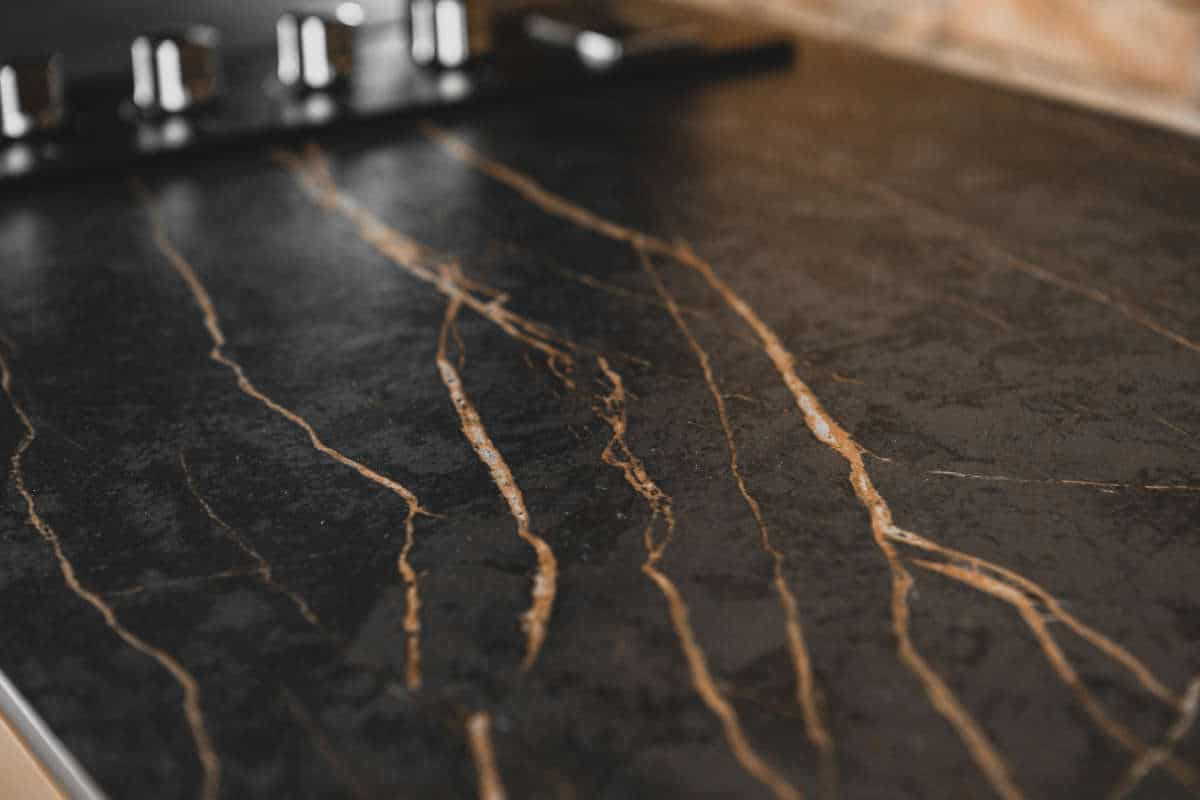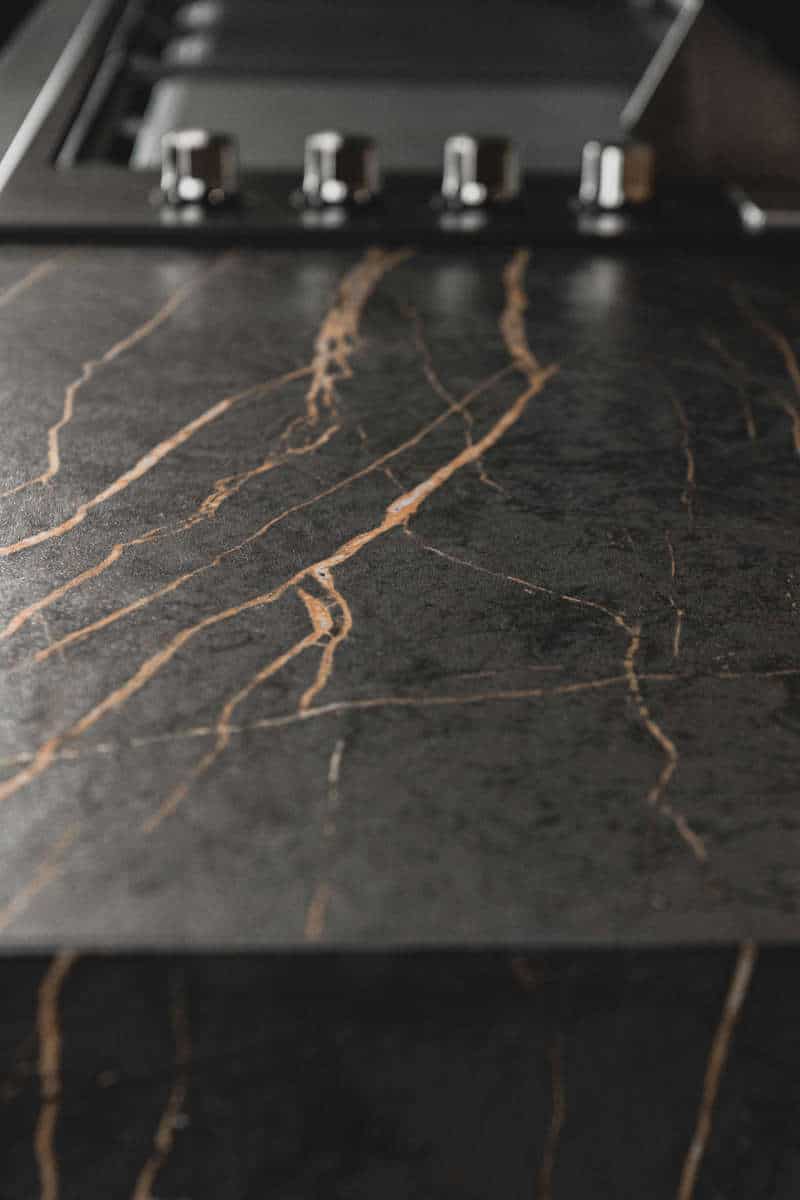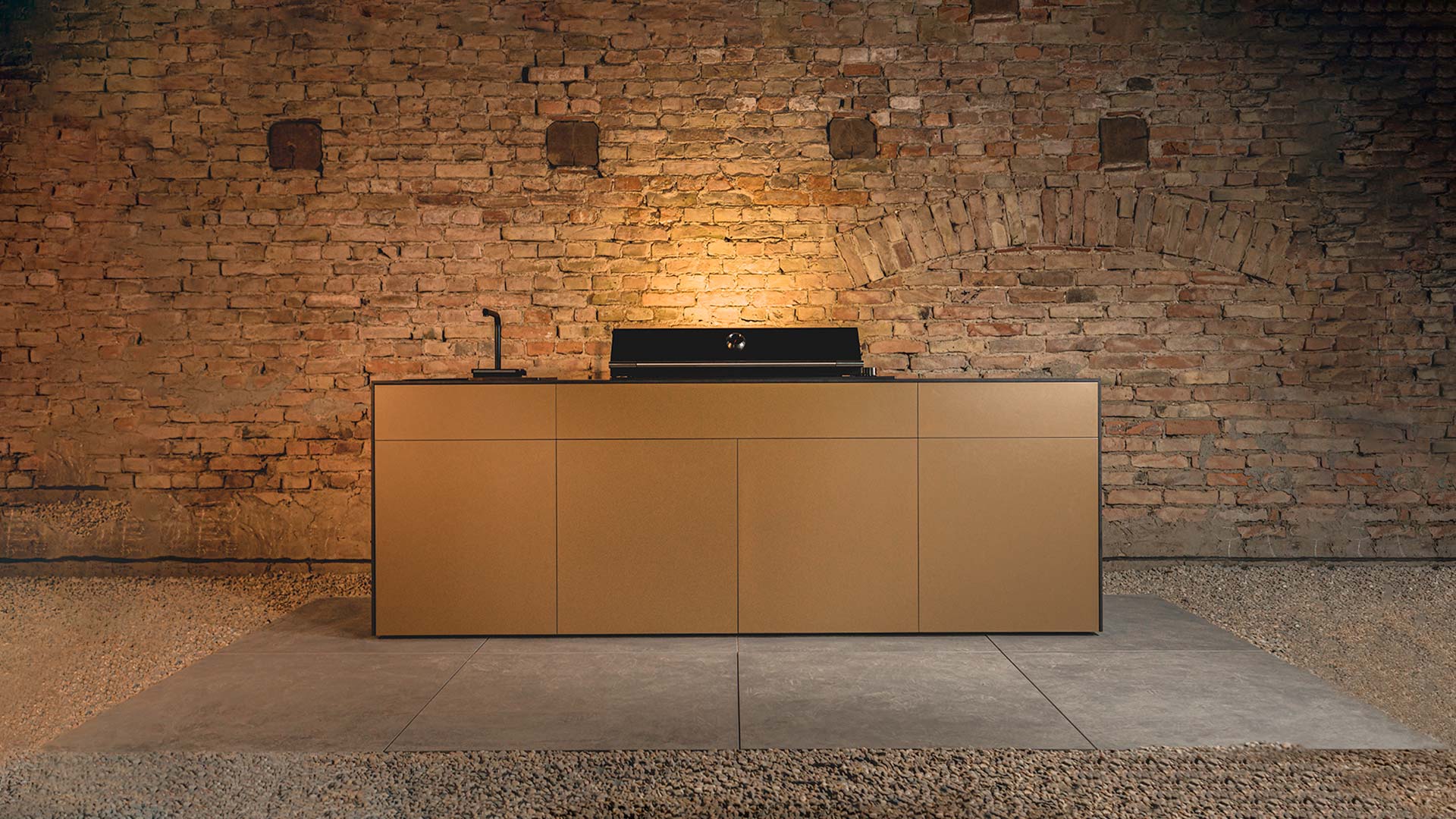DEKTON
It’s a statement
To meet our requirements, a material has to stand out from the crowd. We have found it: Dekton, a man-made stone with an extraordinary look, which we use as worktop and side cladding in all outdoor kitchens.
What can Dekton do?
Robust and aesthetic: Dekton looks as noble as high-quality natural stone, and that in numerous colours and grains. At the same time, the high-tech composite material with the ultra-compact surface from Cosentino impresses with its hardness and resistance to UV light, scratches, stains, heat and cold. We have the extremely easy-care material mitred directly by the manufacturer with the highest precision – as a worktop for your perfect outdoor kitchen from openair kitchen. Learn more about Dekton and its unsurpassed properties, about production, areas of application and care!


Areas of use of Dekton
Dekton is usually used as a material when high resistance is required – in harmony with an outstanding design.
In interior design, we often see Dekton as wall cladding. More abrasion-resistant than granite, it can also be used well as flooring. Worktops or washbasins made of Dekton score points in the kitchen or in the sanitary area due to their high scratch- and break-resistance.
With its robustness and beauty, however, Dekton is particularly suitable for prestigious outdoor areas – i.e. for surfaces that impress with their consistently elegant appearance despite heavy use. The UV-resistant, colour-fast stone is used, for example, to create attractive façades that defy all weather conditions – even extreme heat and frost.
Weatherproof, temperature-resistant, almost indestructible and beautiful: in Dekton, we at openair kitchen have found the ideal panel material for our high-quality outdoor kitchens!
Choose your Dekton colour!
Do you know how the beautiful, natural-looking Dekton grains are created at Cosentino? Raw materials such as glass, ceramics and quartz are compressed under extremely high pressure and sintered at over 1000°C. The result is an ultra-compact high-tech composite in a variety of colours … marbled or solid, metallic or wood-inspired. Make the choice for your dream outdoor kitchen!

Which Dekton worktop for your outdoor kitchen?
Which Dekton grain should your dream outdoor kitchen have? Use our configurator!
Why Dekton in the outdoor kitchen?
Dekton vs Granite
Granite is extracted as a natural stone – Dekton, on the other hand, is created in a specially developed sintering process. Therefore, the ultra-compact material from Cosentino surpasses granite by far in terms of breaking strength and flexural strength. Dekton makes it possible to produce slabs with a “slim look” for modern kitchen design: With a thickness of only 8 mm, it can be used to cut large-area worktops; granite slabs are usually 2-3 cm thick.
Dekton also has a much higher abrasion resistance than granite. The ultra-compact surface is easy to clean with soap and water because it is non-porous. Granite, on the other hand, as a natural stone, needs to be cleaned and treated regularly.
Dekton vs Marble
Marble and other limestones are naturally acid-sensitive and therefore prone to staining. Softer than granite – and therefore much more susceptible to scratches than Dekton – we cannot recommend marble as a worktop for an outdoor kitchen.
Dekton vs Silestone
Both high-tech materials come from Cosentino and are impressive in the kitchen due to their product properties: stain-resistant, water-resistant, non-porous, easy to clean.
So what is the difference? While Silestone, as a quartz composite (93 % quartz content, enriched with glass or mirror pieces) is already extremely hard and resistant, it does not come close to Dekton in terms of heat and acid resistance. For our outdoor kitchens, we use worktops made of Dekton – especially as these are already available in a thickness of 8 mm. Silestone worktops are offered starting from a thicknesses of 12 mm.
Dekton vs Ceramic
Dekton and ceramics both do not occur in nature, but are created by grinding, combining and firing raw materials.
Dekton, like Neolith, is often counted as a ceramic worktop, but this is not correct. Ceramics already have a very good reputation as a worktop material, but Dekton surpasses them. Ceramics consist of organic components (feldspar, clay, porcelain clay and quartz particles), Dekton contains other raw materials such as glass components and goes through a different manufacturing process that makes it a little harder and more resistant to breakage. Dekton also surpasses ceramic in terms of stain and abrasion resistance. And this sentence sums it up: only Dekton can withstand hot pots without a table mat.
Dekton vs Quarz composite
Quartz composite is the generic term for an artificially created rock that consists of 93 percent pure quartz – mixed with colourants and resin. The resin fills the space between the raw materials (= quartz particles) and holds them together.
Dekton – in contrast to quartz composite materials such as Silestone – does not need any resin: Due to the extreme pressure of 25,000 tonnes and the subsequent firing process at 1,200°C, this is not necessary. Therefore, Dekton does not contain any components that could melt at high temperatures and damage the material. This makes it much more heat-resistant than quartz composite.

How is Dekton made?
To produce Dekton, the Spanish manufacturer Cosentino has developed its own process: the particle sintering technology. Basically, this mimics, in a greatly accelerated way, what happens during the formation of natural stone over many millennia: Raw materials are compressed under very high pressure and at very high temperature.
How should one imagine this? The Dekton raw materials glass, ceramics and quartz are compressed with about 25,000 tons of pressure and then fused at 1,200°C to form a slab – a worktop for openair kitchens, for example. The extreme compression process is responsible for the many outstanding properties of Dekton: the result is an ultra-compact glass-ceramic composite that is unaffected by heat or cold, liquids, bacteria or other contaminants. The resistant Dekton panels also impress with their extreme scratch, impact and abrasion resistance.